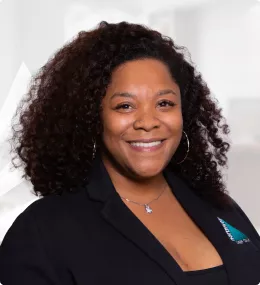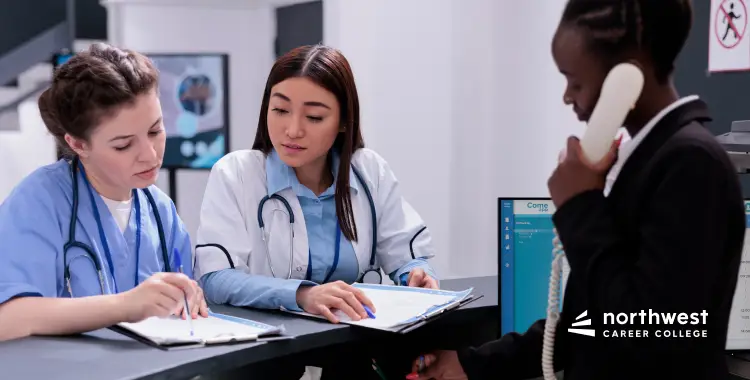The Most Common Healthcare Terms You’ll Hear at the Front Desk
- November 27, 2025
- 1.6k views
- 4 min read
Your first day in a medical office can feel like stepping into a new world. There are new procedures, new equipment, and lots of unfamiliar terminology. You might be apprehensive about hearing all these new words tossed around, but that’s completely okay.
You don’t need to know it all at once, but learning some basic healthcare terms will make you feel more at ease at the front desk. You’ll use these words daily, from scheduling patients to handling phone calls and working with insurance.

Table of Contents
Why Learning Basic Terms Is Important
Working at the front desk means you’re often the first person patients talk to. They’ll ask questions like, “Do I need a referral?” or “What’s my copay?” Doctors and nurses will also speak to you using words that are part of everyday medical office talk.
When you understand these terms, everything becomes easier. You’ll be able to answer questions, avoid mistakes, and help the office run more smoothly. Most of all, it enables you to feel confident and ready to handle whatever comes your way.
Patient and Appointment Terms
You’ll often hear terms like “new patient” or “established patient.” A new patient visits the office for the first time, while an established patient has been seen before. You’ll use this information when scheduling or checking someone in.
“Referral” is another everyday term. Some patients must get clearance from one doctor before they can see a specialist. That clearance is their referral. When someone walks in without an appointment, they’re known as a “walk-in.” You’ll also be handling “follow-up” visits, repeat visits just to check how someone’s doing.
If a patient doesn’t attend their appointment, that’s a “no-show.” If they cancel ahead of time, it’s just a “cancellation.” And don’t forget the “copay”—the small payment, like $20 or $30, that patients often make at the front desk.
Medical Records
A “chart” is where the patient’s medical record is kept. Most offices now have computerized systems known as EMRs or EHRs, which are electronic medical or health records. These computer files contain all the necessary details regarding the patient’s care.
You’ll also hear about “vitals,” basic health stats like blood pressure or temperature. Even if you don’t take them yourself, it helps to know what they mean.
Another important word is “HIPAA.” This is a privacy rule that protects a patient’s health information. Other common words include “diagnosis,” the name of a patient’s health problem, and “prescription,” the medicine the doctor recommends.
Insurance and Billing
You often talk to patients about their insurance when working at the front desk. You may ask for their “policy number” and insurance ID. You might also help explain a “deductible,” which is the amount a patient must pay before their insurance starts to cover costs.
A “claim” is the bill sent to the insurance company after a visit. You may also hear about “prior authorization,” when a doctor needs permission from the insurance before doing a specific test or treatment.
If a doctor is “in-network,” the insurance covers more of the cost. If they’re “out-of-network,” the patient may have to pay more. An “EOB,” or explanation of benefits, is a document showing what the insurance paid and the patient owes.
Tips to Help You Learn These Terms
The more you hear and use these words, the easier they’ll become. Some students keep a small list or cheat sheet at their desks. Others ask their coworkers for help when they’re unsure. That’s perfectly okay; everyone in healthcare has to start somewhere. These terms will soon become second nature with practice and a little patience.
Conclusion
You don’t need to memorize a medical dictionary to be great at this job. Just focus on learning the basics, one step at a time. Every medical administrative assistant you meet once started exactly where you are: curious, unsure, but ready to learn.
Enroll at Northwest Career College and build your skills and confidence to succeed. Graduate in as little as 9 months. Financial aid is available. You can work in hospitals, clinics, and healthcare offices, and it all begins with learning the words that make the job easier.




